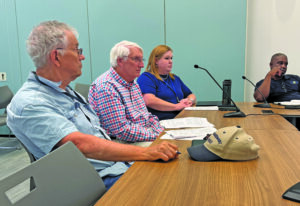“We reject the view that more freedom necessarily entails less equality and community, believing instead with Alexis de Tocqueville that individualism rightly understood is perfectly compatible with community and equality.”
So remarks Robert D. Putnam, author of the bestselling “Bowling Alone,” in his new book, “The Upswing: How America Came Together a Century Ago and How We Can Do It Again.” Putnam is the principal focus of a new video documentary, “Join or Die,” by Falls Church natives, the brother and sister team of Pete and Rebecca Davis, that drew over 200 for a viewing at the Meridian High School auditorium in Falls Church last Sunday.
The Davis sibling team, both graduates of Meridian (being known as George Mason at the time, Rebecca in the Class of ‘01 and Pete in ‘08), were on hand to introduce and take questions about their creation, which has already toured locations around the U.S. in the last year, but which not surprisingly enjoyed its biggest audience right here.
The film drew extensive applause and an enthusiastic response to an offer by the hosts for community organizations to identify themselves in appeals for new participants, which was, after all, the primary point of it all – to get the public to come out of its shells and get more directly engaged in groups that do good work.
The idea is that engaging in groups “is good for you” in a multitude of ways, Pete Davis told the audience. “We have been in a social recession and need a revival, a moral change.”
He challenged the audience to “imagine being together differently” and to address the question, “What kind of legacy do you want to leave behind?”
Representatives of groups in the audience who spoke up to identify themselves and to welcome new people to their work included Falls Church Arts, Welcome Falls Church, the Climate Action Network, the Cable Access Corporation of Falls Church, the American Association of University Women (AAUW), Citizens for a Better City, the Tinner Hill Foundation, the F.C. Homeless Shelter, F.C. Democratic Committee, the Appalachian Trail Club, the Pokemon Go Club, the F.C. League of Women Voters, and the F.C. Bike Club.
Putnam, who is at Harvard where Pete Davis graduated, became famous, as the documentary notes, with his “Bowling Alone” bestseller that earned him a trip to the Whiter House to be honored by then President Obama. His newer book, “Upswing”, talks about how out of greed and massive accumulation of wealth in the hands of a few during the Gilded Age in the latter half of the 19th century came the Progressive Era when Americans joined any number of civic, political and religious organizations to advocate on behalf of needed social change, not the least of which was the achievement of women’s suffrage in 1920.
The documentary highlights the 1960 inaugural address of President John F. Kennedy, when he invoked the simple concept that shaped a generation, “Ask not what your country can do for you, ask what you can do for your country.”
That was followed by the Rev. Martin Luther King Jr.’s “I Have a Dream” speech of 1963 and a decade of mass, relatively-selfless service on behalf of civil rights, antiwar activism and womens and gay rights.
The Davis documentary showed labor organizer Jane F. McAlevey, author of “No Shortcuts, Organizing for Power in the New Gilded Age,” noting that in the early 1970s, there was a movement set afoot to counter the achievements of the 1960s with a promotion of a new surge of self-centered individualism. The goal was to fight social solidarity with a glorification of isolationism.
It started with references to Elks Lodges, groups like the Rochester Anti-Slavery Sewing Society, PTAs, bowling leagues, community churches and way back to the Juntos formed by Benjamin Franklin before the American Revolution that became places where folks gathered to discuss the pressing issues of the day, including in the areas of science and technology.
A revival of participation in groups is needed today to help restore trust in government, which has declined from 75 percent of Americans trusting their government down to 35 percent today, the documentary points out. Hillary Clinton is shown in the documentary noting that clubs were the “training grounds of democracy,” and form the “common bonds of community.”
Calling him “the poet laureate of civil society,” the New York Times has hailed Putnam, the Malkin Research Professor of Public Policy a Harvard and former dean of the John F. Kennedy School of Government, for his research and analysis of “how we once went from an individualistic ‘I’ society to a more communitarian ‘we’ society before we slipped back, and how we can apply lessons from that experience to become a stronger, more unified nation.”












